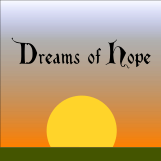Core principles
Every setting has its core principles, the concepts that everything else builds on. Here are the ones for Dreams of Hope.
WIP
The world is familiar on the surface but the depths differ
As players and GMs explore Quartus and Dreams of Hope, they'll find much that is familiar. Objects fall if dropped, water runs down hill, cows and ravens are...cows and ravens. Fire burns wood and can be extinguished by water or suffocation, people need to eat and drink to survive. People bleed when cut and generally look and act like people. As a result, you can make plans using your ordinary, every-day logic, intuition and knowledge about how the world works.
But if you look beyond the surface, beyond what a good, but uneducated shade-tree mechanic or a 12th century alchemist would know, if you look at the details that require modern scientific tools or theories, what you see will surprise you. If you go looking for atoms or DNA, you'll not find them. If you try to build nuclear weapons or even gunpowder, it simply will not work that way. The underpinnings of the world's natural laws (which it has in plenty) share much more in common with Aristotelian thinking or late-medieval alchemy. For example, all matter and energy is composed of the same "thing", aether. Aether can be diffuse or condensed and can have many different elemental aspects, the exact balance of which determine exactly what it is. And magic can (temporarily or permanently) alter those aspects. For another, basic principles such as conservation laws (mass, energy, momentum) are more like suggestions. Objects in motion don't tend to stay in motion--they seek a rest. Objects do not fall due to distortions of space-time (i.e. General Relativity), they fall to the degree that they are composed of umbral elemental aspects, especially umbral earth and umbral water. These differences do not make a difference in every-day life, but drastically change what is possible.
The world is full of adventure
Wherever the players go, that is where the adventure is. Strange occurrences and dangers lurk even in the most "civilized" areas.
The world is full of fantastic aspects
All characters that matter are fantastic (aka magical)--none are mundane. There are no "average joe" player characters. But being fantastic does not mean casting spells. There is much magic that is not spells. In Dreams of Hope, the Charles Atlas superpower is a real thing. Simply training hard enough can give you abilities beyond what is normal or possible on Earth.
Agency is baked into the world's fundamentals
Your choices matter. So do the choices of others. No creature is doomed by birth to be either evil or good, not even the traditionally fixed-alignment outsiders (e.g. angels and devils). Now, of course, many angels are "good" and many devils delight in torture and slaughter and power-seeking. But that's by their choice, not by their intrinsic nature. This goes double for mortals.
Player characters, especially, are agents of change. They end up at the tipping points, at the confluences of forces where even a tiny action can spark a large change.
The world is multiply post-apocalyptic
While the history of Quartus goes back 10s of thousands of years, with some characters having been alive nearly that whole time, civilizations have risen and fallen repeatedly. And their ruins dot the landscape, sometimes re-occurring via time-slips looking like their inhabitants just left. The most recent apocalypse happened about 250 years ago (current in-universe time) and wiped out a supermajority of the population of the world and altered the planes irrevocably.
Each of these apocalypses changed the nature of the world--things that once were impossible have become possible and things that were commonplace are now exceedingly rare or impossible. During the 3rd age, before the latest apocalypse, creation of permanent magic items was not only common, it was an every-day occurrence. Now, only the weakest items can be created; most of the stock comes from ruins and vaults left behind from former times.
The world is fundamentally a good place, despite the horrors
Quartus is a world full of monsters, many of which are indistinguishable on the outside from the other people. However, this does not make it a horror or grimdark setting. The good guys usually (but not always) win. The lives of the common folk are, in most places, fairly safe and happy. Most people go their lives without coming under threat from monsters other than bandits or corrupt officials, and even the latter are not too common in several places.
Adventurers go into the dark places and bring light and change. That doesn't mean adventurers are necessarily knights in shining armor--many are sour and greedy. But they normally act to beat back the forces threatening to bring horror and destruction to the world.
The world is anachronistic
Throw away what you know of the progression of earth technology and society. This is different. Yes, you'll see crossbows coexisting with lamellar armor. Democracy coexisting with tribal societies (as well as tribal societies that participate in democracies). You'll see industrial areas...where people still fight with sword and shield. Semi-autonomous golems and crystal "computers"...alongside stone-age tribes.
The one thing you will never see is chemical explosives, including gunpowder. I don't like the aesthetic. Sorry.
